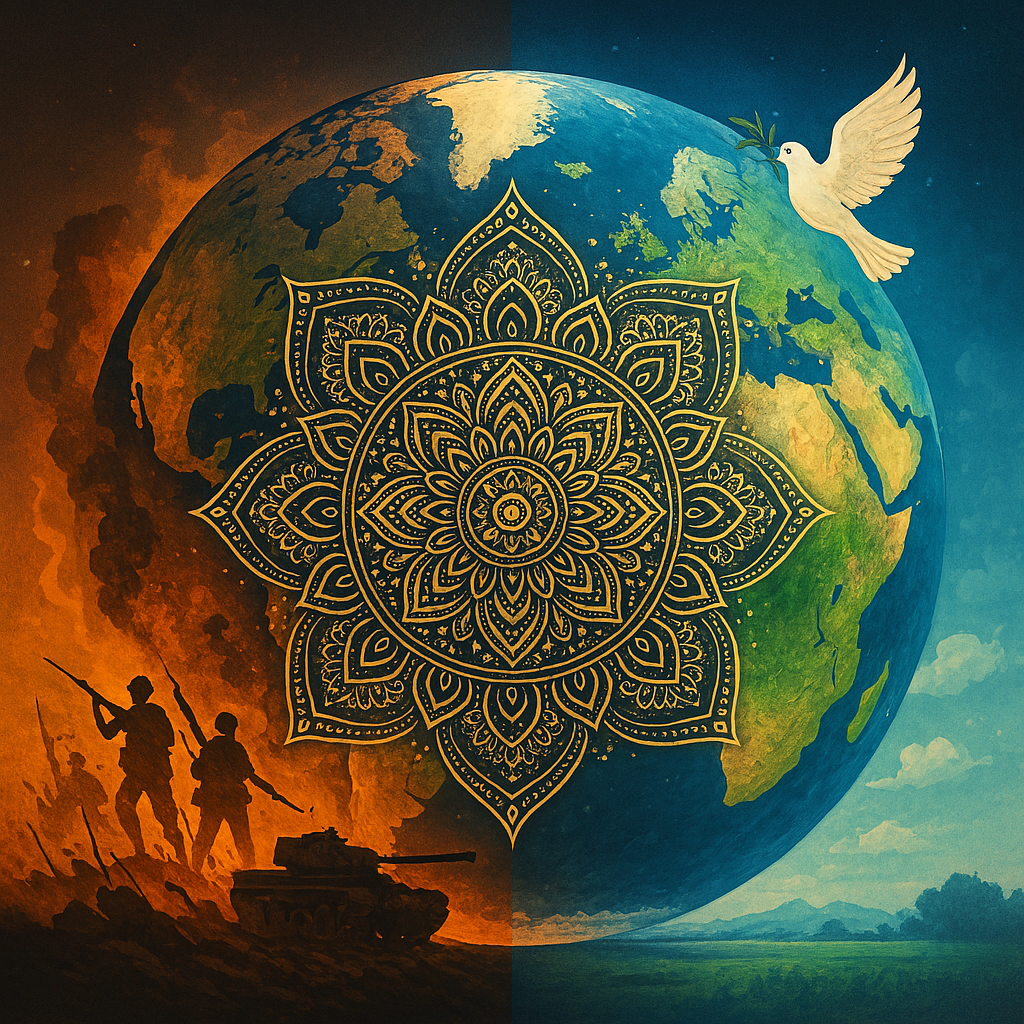“Victory attained by violence is tantamount to a defeat, for it is momentary.”
1. Introduction: War as Humanity’s Ancient Dilemma
War has shaped the fate of civilizations, bringing both catastrophe and, paradoxically, catalysts for growth. From Theosophical teachings to modern science, religious insight to ancient philosophy, a singular question emerges: Is war an inevitable tragedy, or a karmic mirror urging us to awaken?
War reflects not only political tension but also collective unconsciousness. The Greek philosopher Plato once stated, “Only the dead have seen the end of war.” But must this always be the case? Are we doomed to repeat the cycle of violence?
2. Theosophical View: Karma as the Engine Behind Conflict
In Theosophy, karma is a cosmic law of cause and effect that governs all life, including nations. According to H.P. Blavatsky in The Key to Theosophy:
“Each nation has its own karma to work out, just as individuals do.”
Wars are not random. They emerge when accumulated collective thought-forms—such as greed, hatred, or fear—become energetic forces manifesting in physical reality. These collective energies influence decision-makers, societies, and movements.
“There is no injustice in the Universe, only perfect Law.”
— The Mahatma Letters
Karma is not vengeance; it is the balancing mechanism of the Universe. Theosophists believe war is a karmic purging, not divine punishment.
Historical Example: The Fall of Rome
Rome’s colonization, slavery, and systemic inequality created karmic debt. Its fall was not just due to invaders but internal moral decay—a karmic unraveling from within.
3. Collective Karma: National and Global Responsibility
Karma operates on multiple levels. A nation that engages in oppression or exploitation accumulates collective karma. This often manifests as revolution, collapse, or external attack.
“No one suffers except through their own karma, yet all karma is bound together.”
— Annie Besant
The Karma of War Leaders
Leaders who ignite war often act as karmic agents. Figures like Hitler, influenced by collective fear and hate, may serve as vessels for karmic cleansing. They emerge under karmic necessity to bring shadows into light.
4. Philosophical Reflection: Is War a Necessary Evil?
Philosophers like Heraclitus and Hegel saw war as a driver of history. But modern pacifists like Tolstoy and Gandhi argued that moral evolution must replace militarism.
“An eye for an eye makes the whole world blind.”
— Mahatma Gandhi
Eastern Thought: Ahimsa and Dharma
In Hinduism and Buddhism, Ahimsa (non-violence) is sacred. Dharma demands moral action, even amidst conflict. True warriors uphold righteousness, not revenge.
Western Thought: Just War vs. Existential Responsibility
Augustine and Aquinas attempted to define “Just War,” but existentialists like Camus and Sartre emphasized personal responsibility and the moral absurdity of violence.
5. When Both Sides Pray: The Paradox of Faith in War
“My concern is not whether God is on our side; my greatest concern is to be on God’s side.”
— Abraham Lincoln
Both North and South in the U.S. Civil War prayed to the same God. WWI soldiers sang hymns on both sides. This spiritual paradox reveals the human tendency to personalize the divine.
Theosophy teaches that divine beings do not take sides. They support Dharma, balance, and soul evolution—not nationalism.
6. Scientific Insight: Frequency, Resonance, and Thought-Fields
Modern science reveals that thoughts are energetic. Collective negativity can influence Earth’s vibrational field.
The Maharishi Effect
Research shows that group meditation reduces crime and violence. This Maharishi Effect supports the idea that peace begins in consciousness.
7. Gandhi’s Spiritual Response to War
Mahatma Gandhi demonstrated that it’s possible to confront oppression without violence. His principle of Satyagraha—truth-force—channeled moral power to dissolve injustice.
Gandhi believed every act of war creates ripples of future suffering, and only love and truth can neutralize such karmic debt.
8. Ancient Mantras, Texts, and Saints’ Wisdom
Mantra: “Lokah Samastah Sukhino Bhavantu” — May all beings everywhere be happy and free.
The Bhagavad Gita explores war on the battlefield of the soul. Krishna teaches Arjuna that righteous action without attachment is the path of Dharma.
Saints like Francis of Assisi, Yogananda, and Milarepa taught that inner peace must precede outer peace. Their lives offer blueprints for transcending karmic cycles.
9. Toward Transcendence: Humanity’s Choice
Theosophy reminds us that karma is neither curse nor punishment—it is invitation. Humanity is not doomed to eternal war. Through conscious living, meditation, education, and compassion, we can shift collective karma and build an age of peace.
“The only way to abolish war is to make peace more heroic.”
— Ralph Waldo Emerson
Let this article be a spark in that noble pursuit.

Leave a Reply